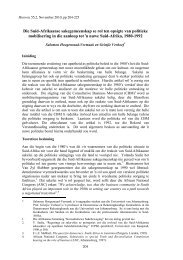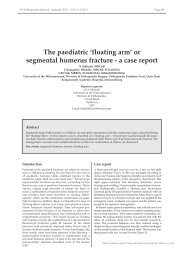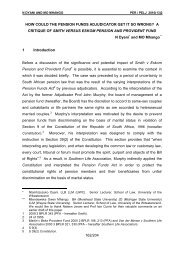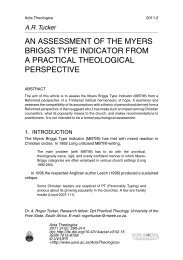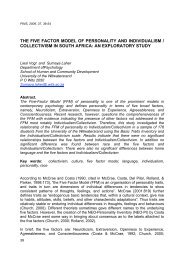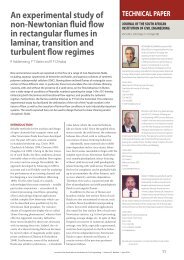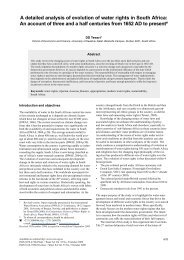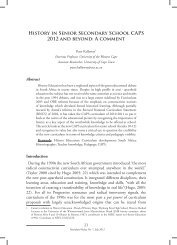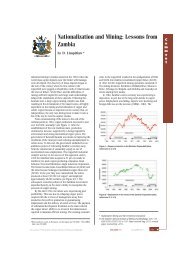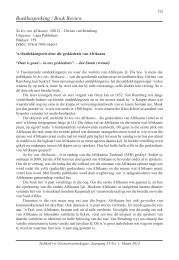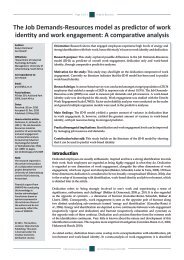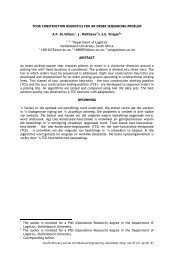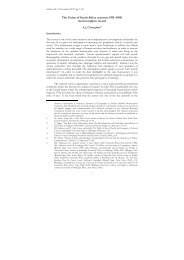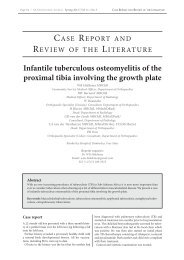91 Hendrik Verwoerd and the Leipzig School of Psychology in 1926 ...
91 Hendrik Verwoerd and the Leipzig School of Psychology in 1926 ...
91 Hendrik Verwoerd and the Leipzig School of Psychology in 1926 ...
You also want an ePaper? Increase the reach of your titles
YUMPU automatically turns print PDFs into web optimized ePapers that Google loves.
<strong>Hendrik</strong> <strong>Verwoerd</strong> <strong>and</strong> <strong>the</strong> <strong>Leipzig</strong> <strong>School</strong> <strong>of</strong> Pscyhology<br />
ideas on <strong>the</strong> evolution <strong>of</strong> civilisation could easily be reconciled with <strong>the</strong><br />
tenets <strong>of</strong> holistic developmental psychology. 83 These taught that a child<br />
gradually learns to differentiate, separat<strong>in</strong>g <strong>the</strong> elements <strong>and</strong> recognis<strong>in</strong>g<br />
<strong>the</strong> structures beh<strong>in</strong>d <strong>the</strong>m. “Psychic as well as cultural development moves<br />
steadily from primitive wholeness towards less primitive, or more<br />
differentiated wholeness.” 84 Differentiation becomes <strong>the</strong> ma<strong>in</strong> criterion for<br />
development <strong>and</strong>, by analogy, is also applicable to ethnic groups. Accord<strong>in</strong>g<br />
to Wundt, primitive cultures are characterised by m<strong>in</strong>imal differentiation not<br />
only <strong>in</strong> <strong>the</strong>ir economies, technologies <strong>and</strong> so on, but also psychologically <strong>in</strong><br />
<strong>the</strong>ir patterns <strong>of</strong> perception. The “primitives” were like children, an<br />
assumption that was widespread amongst colonialists <strong>in</strong> <strong>the</strong> late n<strong>in</strong>eteenth<br />
<strong>and</strong> early twentieth century. 85<br />
Under <strong>the</strong> overarch<strong>in</strong>g concept <strong>of</strong> developmental psychology, Krueger<br />
brought toge<strong>the</strong>r such very different fields as ethnopsychology, child<br />
psychology <strong>and</strong> animal psychology. Wundt’s ethnopsychology <strong>the</strong>refore had<br />
a much longer <strong>and</strong> stronger impact on his successors than did his<br />
elementalist psychology. Significantly, not only <strong>the</strong> right-lean<strong>in</strong>g<br />
psychologists <strong>in</strong> <strong>Leipzig</strong>, but almost all early twentieth-century<br />
psychologists, irrespective <strong>of</strong> <strong>the</strong>ir political predilections, drew <strong>the</strong>se<br />
parallels between “primitive peoples” (Naturvölker) <strong>and</strong> children. 86 However,<br />
<strong>the</strong>ir conceptual differences should not be neglected. Wer<strong>the</strong>imer, for<br />
example, did not draw on ethnocentrism <strong>in</strong> his study <strong>of</strong> <strong>the</strong> way “primitive<br />
peoples” use numbers to calculate. He concluded that calculat<strong>in</strong>g with<br />
abstract numbers was <strong>the</strong> exception, even <strong>in</strong> Europe, <strong>the</strong> usual case be<strong>in</strong>g<br />
“number<strong>in</strong>g”, a practice close to everyday experience. 87<br />
Like Krueger, Volkelt engaged with Wundt’s ethnopsychology aga<strong>in</strong><br />
<strong>and</strong> aga<strong>in</strong> over <strong>the</strong> years. 88 Wundt’s efforts found entry <strong>in</strong>to his numerous<br />
83. See particularly F. Krueger, Über Entwicklungspsychologie: Ihre sachliche und<br />
geschichtliche Notwendigkeit (Wilhelm Engelmann, <strong>Leipzig</strong>, 1<strong>91</strong>5), pp 104, 167ff<br />
<strong>and</strong> critically towards Wundt, pp 200ff.<br />
84. Krueger, “Zur E<strong>in</strong>führung: Über psychische Ganzheit”, p 75; translated from <strong>the</strong><br />
orig<strong>in</strong>al German.<br />
85. That this k<strong>in</strong>d <strong>of</strong> thought is not a th<strong>in</strong>g <strong>of</strong> <strong>the</strong> past can still be seen <strong>in</strong> more recent<br />
comparisons <strong>of</strong> “primitive” peoples to children, for example C.R. Hallpike, The<br />
Foundations <strong>of</strong> Primitive Thought (Clarendon, Oxford, 1979).<br />
86. W. Stern, Die Differentielle Psychologie <strong>in</strong> ihren methodischen Grundlagen (Hans<br />
Huber, Bern, 1994) pp 104ff. See also K<strong>of</strong>fka, Die Grundlagen der psychischen<br />
Entwicklung, pp 31 <strong>and</strong> 250ff.<br />
87. M. Wer<strong>the</strong>imer, “Über das Denken der Naturvölker”, <strong>in</strong> M. Wer<strong>the</strong>imer, Drei<br />
Abh<strong>and</strong>lungen zur Gestalt<strong>the</strong>orie (Wissenschaftliche Buchgesellschaft, Darmstadt,<br />
1967), pp 106–163, especially p 137, where he distances himself from <strong>the</strong><br />
dist<strong>in</strong>ction between higher <strong>and</strong> lower cultures. The questions addressed to<br />
ethnographical fieldworkers show that his approach was <strong>of</strong> a very different quality<br />
to <strong>the</strong> one followed by <strong>the</strong> <strong>Leipzig</strong> psychologists; see pp 151ff.<br />
88. UAL, NA, Krueger, 8, Magical Factors <strong>in</strong> <strong>the</strong> first development <strong>of</strong> human labour<br />
(1<strong>91</strong>3), an English text, which demonstrates <strong>the</strong> direct connection to Wundt’s<br />
<strong>the</strong>ses, as well as 3, Collection <strong>of</strong> notes on <strong>the</strong> topic “taboo”. In Krueger’s personal<br />
file <strong>the</strong>re is a note on 30 June 1909: “S<strong>in</strong>ce his return from America he added well<br />
attended lectures on <strong>the</strong> psychology <strong>of</strong> primitive peoples to his o<strong>the</strong>r teach<strong>in</strong>g.”<br />
See UAL, Faculty <strong>of</strong> Philosophy, Personal file 664, Felix Krueger, Document 18,<br />
112



